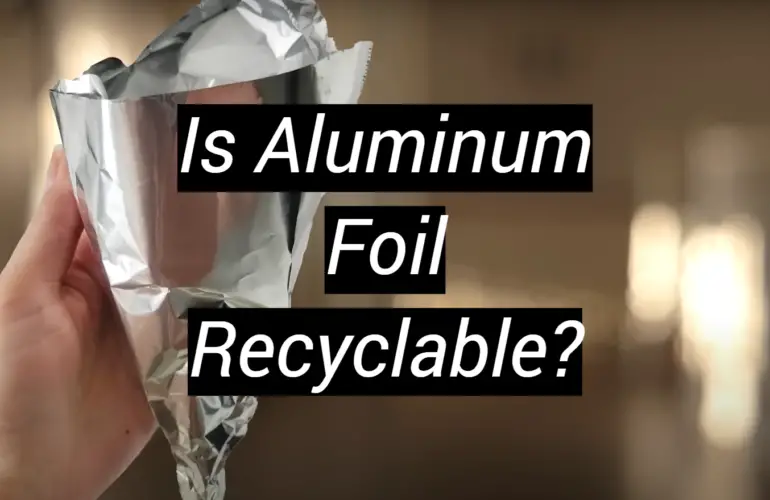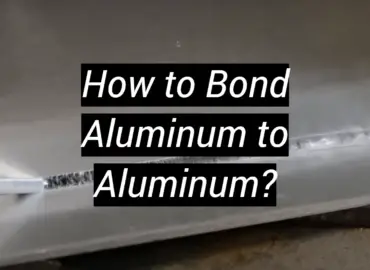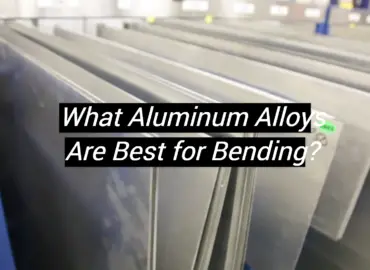Aluminum foil: A kitchen staple that’s essential for lining baking sheets, freezing leftovers and making great picnic food. But have you ever stopped to think about what happens to all of the aluminum foil once it has been used? Can it be recycled, or does it become waste? In this blog post, we will answer the question “Is aluminum foil recyclable?” We will give you tips on how best to reuse and recycle your aluminum foil responsibly. By understanding which materials are recyclable and following these guidelines, we can reduce our impact on the environment and help create a better world for future generations.
What is Aluminum Foil Made of?
Aluminum foil is made of aluminum, a lightweight metal that is abundant in nature. Aluminum is mostly extracted from bauxite ore, which is then melted down and shaped into thin sheets. These sheets of aluminum are then rolled into the foil we know and love. The thickness and quality of aluminum foil can vary depending on its intended use.
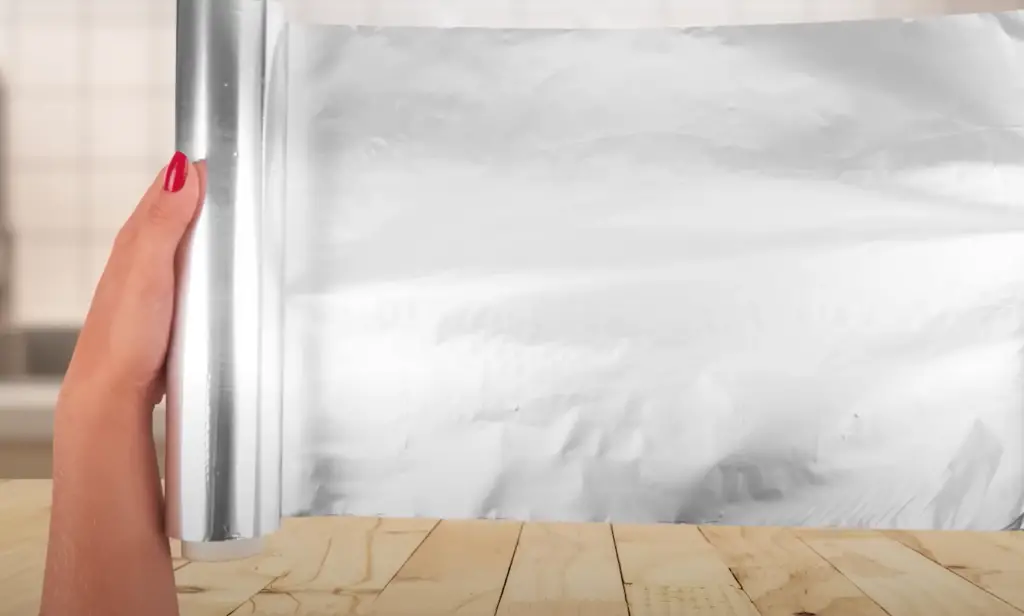
The production process for creating aluminum foil uses less energy than the production of many other materials, making it an efficient material to produce and recycle. It’s also non-toxic, making it safe for food contact as well as for general recycling purposes.
Why Do We Use It?
Aluminum foil is a common kitchen staple, used for a variety of cooking and cleaning tasks. It’s strong, malleable, and provides an easy way to cover or contain food. Aluminum foil is also lightweight and can be easily folded, so it’s ideal for packing lunches or leftovers. Additionally, aluminum foil is also non-stick, meaning that food won’t stick to it when heated in the oven.
However, one of the most important factors when considering aluminum foil’s use in our daily lives is its recyclability. Because of its widespread use and popularity among consumers, aluminum foil has become one of the most commonly recycled materials in the world. This makes it even more important to ask the question: is aluminum foil recyclable?
Is Aluminum Foil Recyclable?
The answer is yes! Aluminum foil can be recycled, though it is not as widely recyclable as other kinds of aluminum, such as cans and trays.
When recycling aluminum foil, make sure you clean off any food residue first. Rinse the foil with water to ensure all remaining scraps are removed before placing it in your recycling bin. It’s also important to scrunch up or crumple the foil into a ball so that it doesn’t take up too much space in the bin. This will make it easier for recyclers to sort and process your aluminum properly.
Aluminum is an infinitely recyclable material which makes it a great choice for sustainable packaging materials – just remember to give it a good rinse before recycling. Although aluminum foil is not as widely accepted in curbside pick-up programs, many cities have recycling centers that will happily take your used foil. Make sure to check the guidelines in your area for what materials are accepted and how they should be prepared.
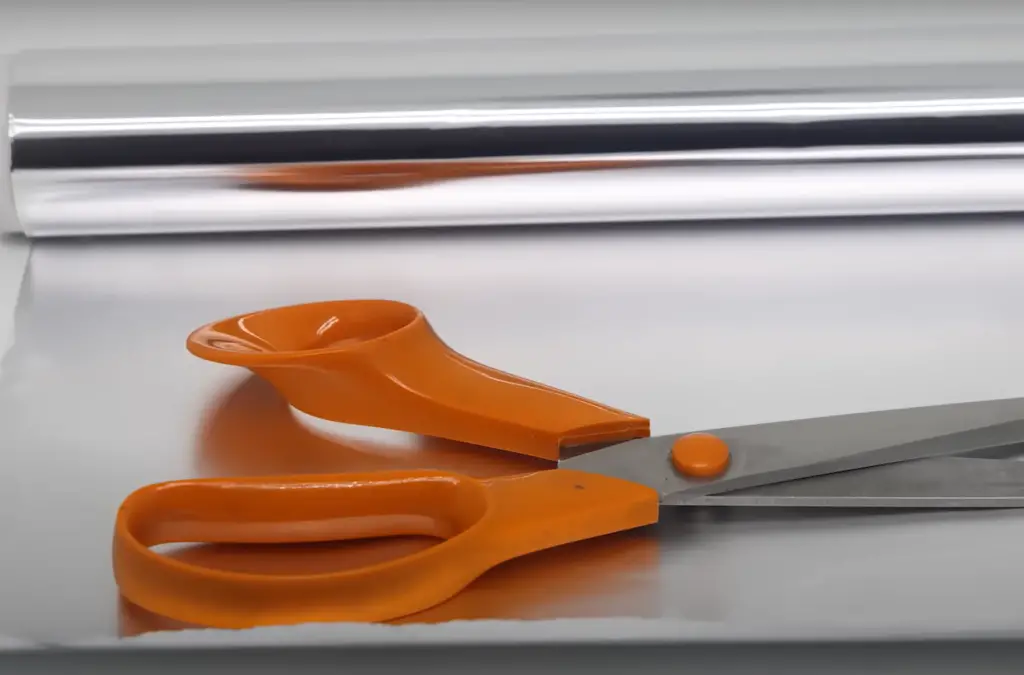
By taking a few simple steps, you can ensure that your aluminum foil goes on to have another life without adding unnecessary waste to landfills or oceans. Recycling aluminum is part of living sustainably and helps conserve energy and natural resources!
How to Recycle Aluminum Foil?
Aluminum foil is recyclable and can be recycled in most curbside recycling programs. To recycle aluminum foil, simply rinse it off and compress it into a small bundle before placing it in your recycling bin. You don’t need to remove the paper or cardboard backing—that will get sorted out during the recycling process.
If you’re unsure if your local program accepts aluminum foil for recycling, check with your local waste management department for specific requirements and instructions. Keep in mind that some communities may have specific regulations regarding items that are accepted for recycling through their programs.
When disposing of aluminum foil, make sure to not contaminate it with food waste or other materials that cannot be recycled. It is also important to note that some types of aluminum foil may require special recycling guidelines, such as those used for baking. Be sure to follow any specific instructions given by your local recycling program when disposing of these items.
Recycling aluminum foil is a great way to help reduce the amount of waste sent to landfills and conserve energy and natural resources. By choosing to recycle, you can help create a more sustainable future! [2]
Reduce and Reuse Before Recycling
Aluminum foil is recyclable, but its lightweight nature means it can easily be blown away or lost during the recycling process. That’s why it’s important to reduce and reuse before recycling wherever possible. Try using a piece of aluminum foil multiple times for cooking, and then recycle when you can no longer use it. You could also try to avoid single-use aluminum foil by using reusable containers that have lids instead. These options are not only better for the environment, but they will also save you money in the long run!

Recycling should always be your last option when considering how to dispose of something like aluminum foil. Even though it is recyclable, too much of it can overload recycling facilities and overwhelm the process. Reducing and reusing is always the best way to go when trying to lessen your environmental impact. By doing this, you’ll save resources and energy that would otherwise be used in the manufacturing process of new aluminum foil.
Overall, remember to reduce and reuse before recycling whenever possible – not just with aluminum foil but all materials! This will help you contribute to a more sustainable future for our planet.
What Does Aluminum Foil Become?
When aluminum foil is recycled, it’s melted down and reformed into new products. Because of its malleability, it can be used for many different purposes including packaging, construction materials and more.
Aluminum foil is often recycled into sheets of aluminum which are then used to produce new containers, cans and other packaging materials as well as parts for cars, bikes and aircrafts. It can also be used in the production of roofing materials, siding or insulation panels. In addition, aluminum is sometimes made into pellets which are then used in the production of soft drink cans and other types of containers.
The recycling process helps conserve energy because it takes significantly less energy to recycle a single tonne of aluminum than it does to produce it from raw materials. This makes aluminum a much more sustainable resource than other materials such as paper or plastic which require significant energy input for production.
By recycling aluminum foil, you can reduce the need for mining and its associated emissions and help preserve the environment. Recycling aluminum also prevents it from being deposited in landfills or ending up in the ocean, where it can be harmful to marine life. So if you have any unused aluminum foil lying around, make sure to recycle it! [3]
Why Recycle Aluminum Foil?
Aluminum foil is an essential item in many households, but it is also one of the most commonly thrown away items. This means that a lot of aluminum foil ends up in landfills instead of being recycled. Recycling aluminum foil can reduce the amount of waste sent to landfills and help conserve natural resources.
Recycled aluminum has many benefits when compared to virgin aluminum produced from bauxite ore. Aluminum recycling requires 95% less energy than production from new materials, making it much more efficient. Recycling also reduces the emission of greenhouse gasses by 95%, as well as other toxins associated with mining and refining raw materials for new products. For this reason, recycling aluminum can have a significant environmental impact.
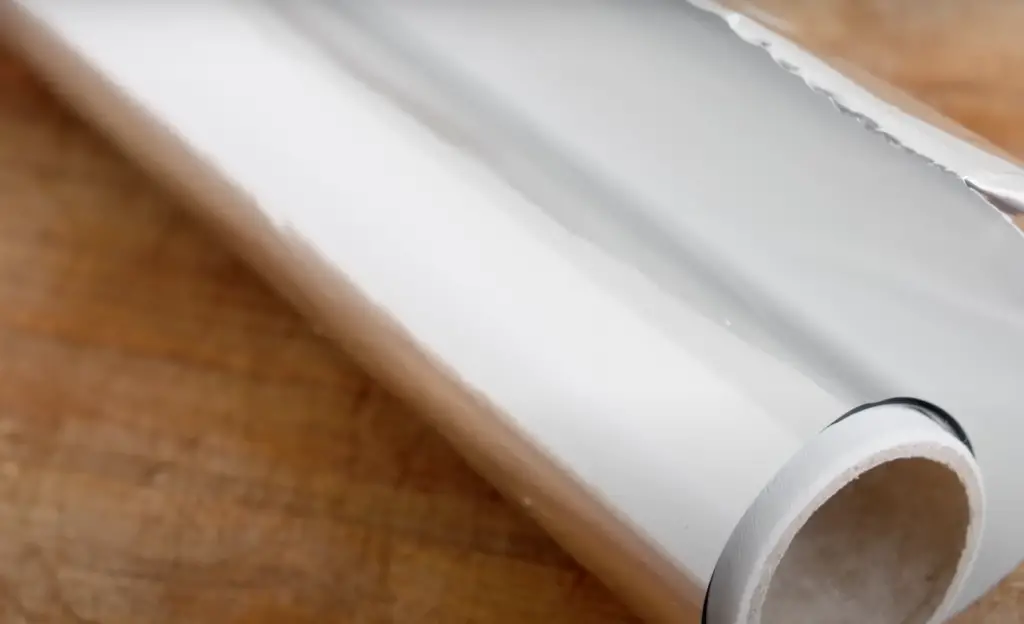
Furthermore, recycling aluminum is economically beneficial. Recycled aluminum can be used to make new products such as cans and foil without any loss of quality or strength, making it a cost-effective solution for many companies. In addition, the process of recycling aluminum helps create jobs in the industry, which can help stimulate local economies.
In conclusion, recycling aluminum foil has numerous benefits that can help protect our environment and support our economy. It is important that we all do our part to reduce waste by recycling items like aluminum foil whenever possible. Doing so will help ensure that future generations have access to clean air and resources.
Useful Tips on Recycling Aluminum Foil
Aluminum foil can be recycled if it is clean and uncontaminated. To ensure that your aluminum foil gets recycled, there are a few tips to keep in mind:
- Before recycling, thoroughly rinse off any food residue from the aluminum foil with cold water. This will help prevent contamination of other recyclables.
- Avoid crumpling the aluminum foil into balls or folding it too much as this may make it difficult for machines at the recycling plant to sort properly.
- If possible, cut large sheets of aluminum foil into smaller sizes before disposing of them for easier sorting and processing at the plant.
- Check with your local recycling center to see what type of packaging they accept for recycling, and if aluminum foil is one of them.
By following these tips, you can help make sure that your used aluminum foil gets recycled and does not end up in a landfill. Recycling aluminum helps protect the environment by conserving resources and reducing waste. So do your part to help save the planet by properly disposing of your aluminum foil! [4]
Cons of Recycling Aluminum Foil
Although aluminum foil is recyclable, there are a few drawbacks to recycling it.
One of the biggest issues is that it can be difficult to clean off any food residue on the foil before throwing it away. If the foil has not been thoroughly cleaned, it may contaminate other materials in the recycling bin or disrupt the efficiency of the sorting machines.
Additionally, if aluminum foil is crumpled up too much into a small ball, it can clog sorting machines and cause problems with waste management processes.
Another issue is that many types of aluminum foil have non-aluminum coatings which make them unrecyclable. This means that any rolls or packages marked “not for recycling” should not be placed in your recycling bin.
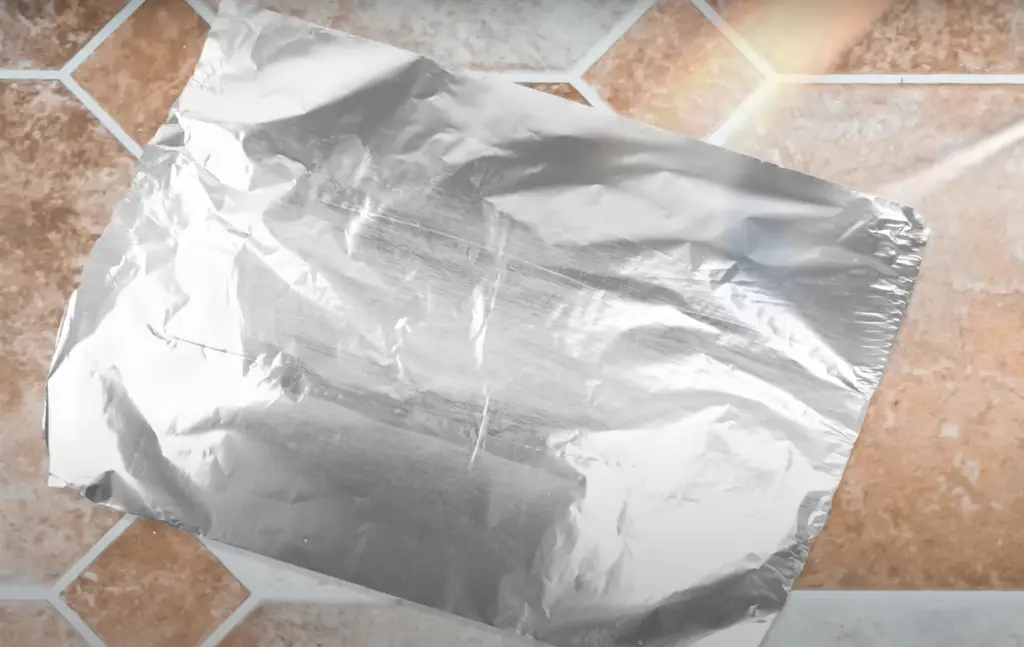
Though aluminum foil is recyclable, these issues make it important to think about how you throw away any foil packaging and to clean off food residue before recycling. Doing so can help ensure that the foil can be recycled properly, and reduce waste management problems caused by improper disposal.
Is Tin Foil And Aluminum Foil The Same?
Tin foil and aluminum foil are not the same. Tin foil is made from tin, while aluminum foil is made from aluminum. Both serve similar purposes of preserving food and keeping it safe for storage but they have different qualities. Tin foil is more malleable and less likely to tear than aluminum foil, making it ideal for wrapping foods with irregular shapes or that may contain sharp edges.
It also can withstand higher temperatures due to its higher melting point compared to tin foil. However, both tin and aluminum foils are recyclable so you can still do your part to reduce waste. When disposing of either type of foil, be sure to clean it first and flatten it out before recycling.Overall, tin foil and aluminum foil are very different materials that serve similar purposes but have distinct qualities that make them better suited for certain tasks. Both types of foil can be recycled so you can still do your part in reducing waste while using these products. So whether you choose tin or aluminum foil, know that you’re making an eco-friendly decision! [5]
Is Aluminum Foil 100% Aluminum?
No, aluminum foil is not made from 100% aluminum. In fact, it’s a combination of several different metals, including iron and copper. The primary metal used to make aluminum foil is pure aluminum, which gives the product its strength and formability. However, other metals are added to improve properties such as electrical conductivity and corrosion resistance.
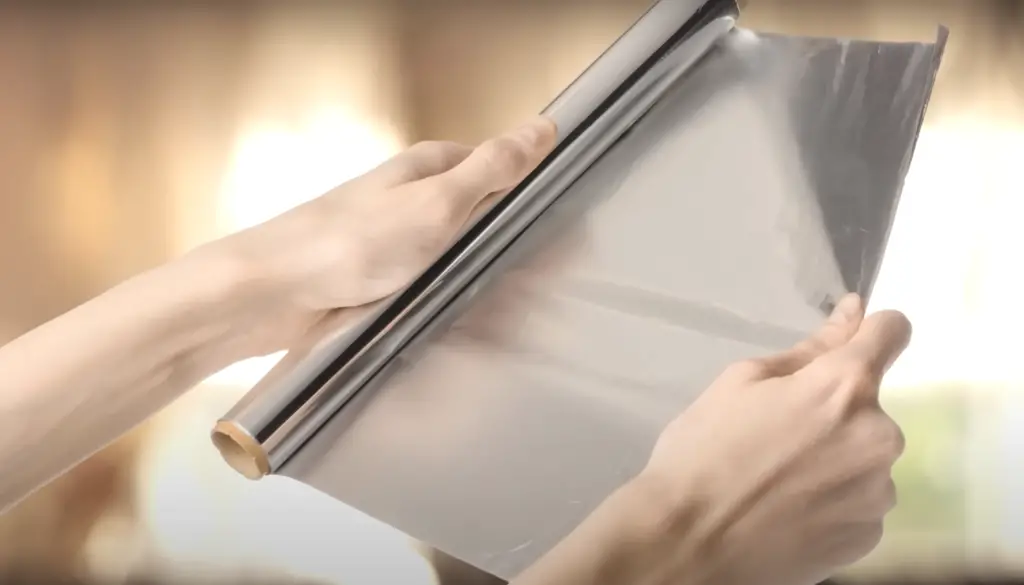
The result is a lightweight yet strong material that can be shaped into thin sheets for use in kitchen applications like wrap for food products or baking dishes. So while aluminum foil isn’t 100% pure aluminum, it does still offer many benefits that make it an ideal choice for wrapping or covering food items.
FAQ
Can you put aluminum foil in the recycling bin?
It depends on where you live. In some cities, aluminum foil can be recycled, but in most cases it must be cleaned first. If your city does not recycle aluminum foil, you may want to consider other options such as donating to a local charity or using it for crafts projects. Additionally, check with your waste management provider to see if they offer an alternate recycling solution.
Do I need to clean the aluminum foil before I recycle it?
Yes, any food residue should be removed from the foil before recycling it. This will help ensure that it is properly processed and doesn’t contaminate other recyclables or cause a blockage in the system.
Are there any creative ways to reuse aluminum foil?
Absolutely! Aluminum foil is so versatile that it can be used for a variety of creative and practical purposes. Here are some great ideas for reusing aluminum foil:
- Use it to line your baking sheets instead of parchment paper – this will help keep them clean while cooking!
- Create an art project by making small sculptures out of the foil.
- Make a homemade solar cooker by wrapping a cardboard box in aluminum foil – perfect for outdoor summer projects!
- Create bubble wrap alternatives by cutting up pieces of aluminum foil into small squares and using it instead.
- Line your cabinet shelves with aluminum foil to make cleaning easier.
- Protect plants from frost damage during winter months by covering them with aluminum foil overnight.
- Use aluminum foil to cover leftovers and keep them from drying out.
By being creative with how you use and reuse aluminum foil, you can drastically reduce the amount of waste produced.
How do you dispose of foil?
When it comes to disposing of aluminum foil, it is important to note that the material is recyclable. However, depending on where you live, you may not be able to easily recycle it through your local collection system. If your community doesn’t accept aluminum foil for recycling, the best way to dispose of it is by throwing away or composting with regular household trash. It’s also a good idea to make sure any food residue has been removed from the foil before disposal. To do this, simply rinse off the foil using warm water and dish soap. Make sure to dry before placing in your trash can or compost bin for pickup. If recycling isn’t an option in your area, consider other ways to reuse foil before throwing it away. For example, you can use aluminum foil to cover and protect food in the refrigerator or freezer, line baking sheets for easy clean-up, and even wrap gifts with it. So, while recycling is always encouraged when possible, there are still plenty of other ways to make good use of your aluminum foil before tossing it out.
Is aluminum foil more eco-friendly than plastic?
Unfortunately, aluminum foil isn’t necessarily a more eco-friendly option than plastic wrap. While aluminum foil does have some advantages over plastic—such as being recyclable and reusable in certain cases—it’s not necessarily the best choice for the environment. For starters, while aluminum can be recycled multiple times without losing its quality, it takes a lot of energy to melt down and reform it into new products. Additionally, when compared to other materials like paper or glass, aluminum still requires a considerable amount of energy and resources to manufacture. As such, you might want to consider using alternatives like beeswax wraps or even parchment paper before reaching for the tin foil.
What can replace aluminum foil?
When looking for an alternative to aluminum foil, it is important to consider both environmental and practical factors. Alternatives include wax paper, parchment paper, silicone baking mats, reusable cloths or towels, plastic wrap or bags, and oven liners made from glass fiber cloth.
Wax paper is a common alternative to aluminum foil as it can be used similarly but without the potential for recycling. It is also slightly cheaper than foil and much less prone to tearing or crinkling. However, wax paper should not be used in the oven as it is not heat-resistant.
Parchment paper can also replace aluminum foil in many kitchen tasks but has similar drawbacks to wax paper when it comes to heat resistance. Silicone baking mats are useful in the oven as they can withstand temperatures up to 450 degrees Fahrenheit and provide a nonstick surface that is easy to clean.
Reusable cloths or towels can also be used instead of aluminum foil for tasks such as covering dishes while cooking, steaming vegetables, or wrapping food. These materials are generally durable, washable, and reusable. Plastic wrap or bags are waterproof and cost effective but should not be used when reheating food in the microwave.
Lastly, oven liners made from glass fiber cloth are an ideal replacement for aluminum foil as they offer superior heat resistance and durability without harming the environment. They can easily be wiped down with soap and water after each use making them a convenient and eco-friendly solution.
Overall, there are many alternatives to aluminum foil for kitchen tasks that can help reduce wasteful practices and keep the environment safe. Depending on what is needed, any one of these products may be a better choice than aluminum foil.
Useful Video: Recycling Tips: Aluminum Foil
Conclusion
In conclusion, aluminum foil is generally recyclable but it depends on the local recycling policies for your area. Be sure to check with your local waste management company and find out if they accept aluminum foil in their recycling programs. In certain instances, you may be able to compost or reuse the foil instead of tossing it out. Whether you choose to recycle it or not, be sure to properly dispose of all used aluminum foil. This will help the environment by reducing the amount of waste that ends up in landfills. Thanks for reading!
References:
- https://naparecycling.com/guide/aluminum-foil/
- https://earth911.com/recycling-guide/how-to-recycle-aluminum-foil/
- https://recyclecoach.com/blog/aluminum-foil-recycling-7-must-know-tips-for-work/
- https://everydayrecycler.com/aluminum-foil-recycling/
- https://www.thekitchn.com/stop-throwing-out-your-aluminum-foil-247005

